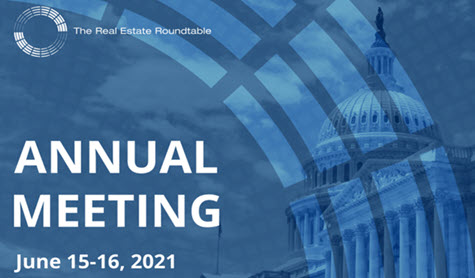
National lawmakers and industry leaders this week discussed a wide range of policy issues – including cybersecurity, infrastructure, climate, taxes, and post-pandemic reopening of businesses – during The Real Estate Roundtable’s 2021 Annual Meeting, where John F. Fish (Chairman and CEO, Suffolk) was elected as Roundtable Chair, effective July 1. (Watch Incoming Chair Fish’s remarks)
Leadership:
Policy Issues & Featured Speakers
Policy Advisory Committees
The Roundtable’s 2021 Annual Report will be distributed in July. Next on The Roundtable’s Meeting Calendar is the Oct. 5 Fall Meeting in Washington, DC. (Roundtable-level members only)
# # #
Senate members announced this week that they are pursuing a two-track approach in assembling an infrastructure package in response to President Biden’s original multitrillion dollar proposal – a pared-down bipartisan plan, and a much larger Democratic plan that could advance on a narrow, party-line vote path.
Bipartisan Framework
The Reconciliation Path

The Roundtable’s Annual Meeting this week also featured discussions with policymakers on the evolving infrastructure debate – and the organization plans to remain fully engaged with lawmakers on any eventual legislative proposal that could affect commercial real estate.
# # #
The need for policymakers to preserve longstanding tax law governing partnerships and profits interests – carried interest – was the focus of a June 16 letter sent by The Real Estate Roundtable and 14 other national real estate organizations to congressional tax writers.
Pending Proposals
Reality vs. Perception
Retroactive Change
The Roundtable’s Tax Policy Advisory Committee (TPAC) met June 16 during The Roundtable’s Annual Meeting to discuss the carried interest proposals and the current tax legislative landscape in Washington.
# # #